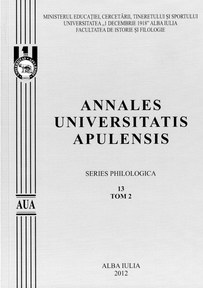Cognition et catégorisation
Cognition and Categorisation
Author(s): Oana Maria PăstaeSubject(s): Language and Literature Studies
Published by: Universitatea »1 Decembrie 1918« Alba Iulia
Keywords: theory of idealized cognitive models; cognition; categorization; metaphor; joy
Summary/Abstract: This paper investigates the link between cognition and categorization in order to see how to structure the cognitive categories that play a considerable role in the work of cognitive semantics. Our goal is to advocate for external linguistics related to our cognitive abilities and to the knowledge of the world instead of independent or internal linguistics. We find that an approach based on idealized cognitive models provides the best fit to human categorization behavior. In the first part, we present the theory of idealized cognitive models of Lakoff seen as an approach that illuminates and describes some possible ways of structuring categories. The central idea that we intend to defend is that we organize our knowledge by means of idealized cognitive models. Rosch’s discovery according to which categories have “fuzzy” boundaries led Lakoff to a reflection on his own views inviting him to apply this new view to linguistic categories. We examine the nature of ICMs (idealized cognitive models) and look at the various ways in which they are structured: propositional ICMs, image schematic ICMs, metaphoric ICMs and metonymic ICMs. Propositional ICMs consist in propositional knowledge. For example, the fact that fire is dangerous. Image schema can be seen like containers or part – whole: our knowledge about the sweets include a schema of the object. Metaphoric and metonymic ICMS are structured by “imaginative devices” (Lakoff, 1987 : p. 285). In the second part, we will support the idea that emotions, like joy, have a complex conceptual structure.Finally, we consider that our cognition needs flexible category theories when interact with objects from external world that is why we need all the time to adjust knowledge to concrete or abstract situations.
Journal: Annales Universitatis Apulensis. Series Philologica
- Issue Year: 13/2012
- Issue No: 2
- Page Range: 477-486
- Page Count: 10
- Language: French

